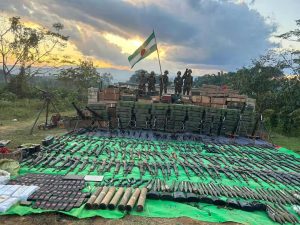An ethnic minority army in northeastern Myanmar says that it is willing to hold talks with the country’s military junta, acknowledging the Chinese government’s efforts to broker a settlement.
In a statement released on Telegram late on Monday, the Ta’ang National Liberation Army (TNLA) said that it wanted a halt to the military’s air strikes in regions under its control. It also expressed its desire for negotiations and its appreciation for Beijing’s effort to bring the two sides together.
“Our civilians are suffering from air strikes and other difficulties. So, we need to find a way out,” TNLA spokesperson Lway Yay Oo said, according to Reuters.
The TNLA is a member of the Three Brotherhood Alliance of ethnic armed groups, which last year launched a coordinated offensive known as Operation 1027. In the year since, the Alliance has succeeded in seizing large swathes of territory in northern Shan State, as well as in Rakhine State in the country’s west. This has included long stretches of the border between Shan State and China, as well as major conduits of the overland trade between the two nations.
In early August, the TNLA’s partner, the Myanmar National Democratic Alliance Army (MNDAA), succeeded in capturing Lashio, the de facto capital of northern Shan State and the seat of the Myanmar military’s Northeast Regional Command. The loss of the Regional Command was unprecedented in the history of Myanmar’s armed forces and marked the junta’s most humiliating defeat since the February 2021 coup. These advances brought the Alliance and allied People’s Defense Forces (PDFs) one step closer to launching large-scale attacks into Myanmar’s central dry zone.
In the months since, as the Myanmar military’s battlefield fortunes have declined further, Beijing has intensified its pressure on the TNLA and MNDAA to halt their attacks and return to the negotiating table. It has closed border gates adjoining territories controlled by the two groups and also used its considerable influence with the United Wa State Army, arguably the most powerful ethnic armed group in Myanmar, to deny these other groups access to electricity, water, internet connections, and other supplies. Earlier this month, reports emerged that Chinese authorities had detained the MNDAA’s commander, Peng Daxun, and placed him under house arrest in Yunnan, in a bid to force him to withdraw his forces from Lashio.
At the same time, fearing that the junta’s collapse would be deleterious for China’s economic and strategic interests in the country, Beijing has stiffened its support for the military regime. Last month, China took the notable step of inviting coup leader Senior Gen. Min Aung Hlaing to China for the first time since the February 2021 coup. This month brought reports that China has proposed the establishment of a “joint security company” with the military junta in order to ensure the safety of Chinese projects and personnel in the country.
Chinese officials have also thrown their support behind the junta’s planned “election” as a potential mechanism for the resolution of the civil war. On November 22, Myanmar Now reported that China was preparing to lend 1 billion yuan ($138 million) to the military regime, a portion of which is earmarked for a national census ahead of the election, which the military administration hopes to hold sometime in 2025. The remainder will support infrastructure projects and surveillance systems.
The Chinese goal appears to be to end the fighting and create a stable compact that will allow trade to start flowing again, and for progress to resume on China-backed infrastructure projects. Such a goal would foreclose both the country’s descent into anarchy and the possibility of the National Unity Government (NUG), which Beijing reportedly views as aligned with the West, establishing itself in a position of prominence.
Yesterday, a spokesperson for China’s Foreign Ministry said that the Chinese government opposed any outbreak of war and chaos in Myanmar and urged all parties to cease fighting and resolve conflicts through dialogue.
“China will continue to actively promote peace talks and provide support and assistance to the best of its ability to the peace process in northern Myanmar,” the spokesperson said, Reuters reported.
The TNLA’s announcement that it is willing to put down its weapons, at least for now, suggests that the Chinese effort to alter the trajectory of Myanmar’s conflict is having some effect. But it remains unclear how far, and for how long, this influence can keep the conflict at bay. While they have established relationships with Chinese officials across the border in Yunnan, neither the MNDAA nor TNLA are Chinese proxies, and both have their own political goals to which they presumably remain committed.
In September, under apparent Chinese pressure, the MNDAA issued a statement dissociating itself from the NUG and said that “it would cease fighting immediately and cooperate with China to solve Myanmar’s conflicts through negotiation.” At the same time, the statement said that the MNDAA reserved its right to maintain its autonomy and ensure its self-defense, and has since resisted Chinese insistence that it withdraw from Lashio, the occupation of which provides a thick security buffer around its core territories to the north.
Beijing clearly has enough leverage to bring these various factions to the table. But can it make them negotiate in good faith?

































